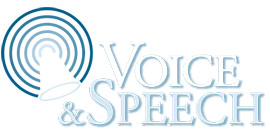Transcript
Last week, one of my students asked, “When I finish doing my daily exercises, what then? Do I just turn around and walk out the door?” That was a good question no one ever asked before, and it reminded me of the three focusing questions.
My grad school instructor used to end every class with a group circle and three questions. “What is your discovery? What is your challenge, and what is your practice?” I continue to use that exercise after every lesson with my students, and it would be a valuable way to wrap up your private practice as well.
Over the years, I’ve reworded the questions to make them more straightforward for my typical business clients. So let’s take a look at each one and consider why it’s helpful.
“What felt good, today?” Let’s face it, voice training isn’t sexy. It’s slow-moving, repetitive and your progress isn’t always obvious. It’s a challenge to keep yourself motivated long enough to see the ultimate results. One way to counteract that is to focus on what feels good. That’s positive reinforcement and there’s a natural motivation to want more of that.
Your tendency is to get stuck on the things that don’t seem to go well. Look for the moments of pleasure in your practice. What felt good? What was your aha! moment? Consciously highlighting those discoveries at the end of your practice will leave you with a positive overall impression and one you’ll more likely want to repeat.
“What felt challenging, today?” One obstacle to effective practice is your desire to get the end result, now. You want to believe you’re further along than you really are. It’s tempting to say, “That was easy. I got this.” But real learning happens at the far edge of your ability. If you’re not experiencing difficulty once in a while you’re not learning anything new.
In voice training there’s always room for improvement. You need to clearly identify what bad habits still need to change and what techniques still need reinforcement. Knowing your current challenge empowers you to monitor yourself in real-life situations and ensure ongoing progress.
“What small skill could I reinforce throughout my day?” Once you complete your practice it’s easy to think, “Whew, glad that’s done,” and forget about it for the rest of the day. That creates a disconnect between what you do in your exercises and what you do in your daily life. Practice is all about bridging that gap, and you do it one small skill at a time.
By consciously selecting a specific skill you can reinforce throughout the day, you turn your daily activities into opportunities for practice and speed up your progress. You also make the practical application of your skills more manageable when you’re not trying to apply everything at once. You set yourself up for success.
You can cover a lot of material in your weekly lesson, and your daily practice might include twenty different exercises, or more. When you’re done, it can seem like a blur and you’re mostly left with your last impressions. If you ended on a difficult note, that can be discouraging. If you ended on a breakthrough, that can make you overconfident.
The three focusing questions help you frame your practice in a way that’s encouraging and constructive. They give you clarity about how to continue your practice throughout the day and begin applying your skills in real-life situations. The questions teach you how to coach yourself.
Thanks for watching. Subscribe if you haven’t already, and please share some of your techniques for getting the most from your practice whether that’s voice and speech training, athletics or some other form of personal development. I’ll see you in the next video.
Voice Training: 3 Focusing Questions
Voice training takes a lot of practice, and it’s very easy to just go through the motions. But successful skill-building requires more than just repetition. It demands focus. Here are three focusing questions to consider at the end of each voice training session. They will help you coach yourself.


